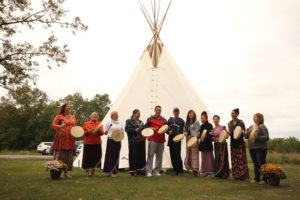First Nations Technical Institute celebrate high employment rates

By Rick Garrick
TYENDINAGA MOHAWK TERRITORY—First Nations Technical Institute (FNTI) is celebrating a 93 per cent employment rate among last year’s graduates thanks to a focus on education and being workplace ready.
“We’ve been collecting a lot of data over the last few years, so now we are able to actually demonstrate the successes we are having [with] graduation rates and employment rates,” says Suzanne Brant, president of FNTI. “We know the graduates that graduated this past year, we can now demonstrate that we have a 93 per cent success rate with them — they’re employed.”
Brant also stressed that FNTI has an 86 per cent graduation rate.
“Our university [graduation rates] are actually 100 per cent,” Brant says. “They vary in terms of college and university.”
FNTI offers programs that are centered around the jobs and roles that are needed in Indigenous communities across Canada.
“We believe this is a unique advantage to our learners,” Brant says. “We center our curriculum and programs based on need and employability within the communities we serve. Our learners go back to their communities equipped with the skills and experience they need to be workplace ready.”
Brant says there is currently a shortage of pilots in Canada so the graduates of the First Peoples’ Aviation Technology – Flight program have a 100 per cent employment rate.
“Before they are even done with the program, they are getting calls from industry,” Brant says. “So they are in employment as soon as they leave.”
In addition to the Aviation Technology program, FNTI offers a range of college diploma programs for 2019, including Social Service Worker, Mental Health and Addiction Worker, Community and Justice Services and Early Childhood Education.
FNTI also offers a college certificate program — Personal Support Worker; a university degree program — Bachelor of Arts Public Administration; and two university graduate degrees — Professional Master of Public Administration and Master of Social Work.
“We do our programming in an intense professional mode,” Brant says. “So it is a college or university program, but what we do is we offer it in a 40-week or 45-week [period] depending on the program.”
Brant says the students usually study on campus for one week per month and in their home communities for the other three weeks, which enables them to continue with their jobs and meet family commitments or other commitments in the community.
“The main advantages of going through our programs is they are Indigenous based, not just the curriculum, but also the way we deliver,” Brant says. “We have Indigenous instructors in the classroom, we have cultural advisors in the classroom and we have Indigenous student support facilitators in our classrooms.”
Brant says all of FNTI’s curriculum has Indigenous learning outcomes.
“[The students] learn all the regular outcomes that are in a college or university program,” Brant says. “But we also enhance them with Indigenous knowledge so that it is more relevant to their learning and themselves and their communities.”
Brant says the Indigenous Institutes are currently moving towards institutional accreditation so they will have the same status and recognition as a college or university after the Indigenous Institutes Act was passed last December by the provincial government.
“Once we have that institutional accreditation, we will be able to grant our own degrees and diplomas,” Brant says. “Right now we have to partner to do that. So FNTI has been working very diligently to create degree programs in Indigenous Based Knowledge, Justice, Midwifery, Bachelors of Education, [and] Bachelors of Social Work.”
Information about FNTI is available online.


